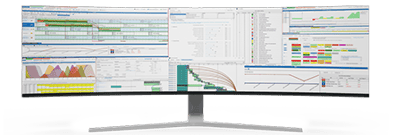Procurement Lead Times Using AI-Driven Insights
Procurement managers face the arduous task of ensuring a seamless flow of materials while maintaining cost efficiency in medical manufacturing. The realm of procurement has seen a significant transformation with the integration of AI-driven insights, revolutionizing the way lead times are managed.
In this blog, we look into the importance of optimizing procurement lead times and explore how the integration between PlanetTogether and leading ERP, SCM, and MES systems can empower purchasing managers in medical manufacturing facilities.

The Significance of Procurement Lead Times
Procurement lead time refers to the duration between the initiation of a purchase requisition and the delivery of the purchased goods. In the medical manufacturing sector, where precision and punctuality are non-negotiable, efficient procurement lead times are crucial. Delays in the procurement process can disrupt production schedules, lead to inventory shortages, and ultimately impact customer satisfaction.

Challenges Faced by Purchasing Managers
Purchasing managers encounter various challenges in managing procurement lead times effectively:
Complex Supply Chains: Medical manufacturing involves intricate supply chains with multiple stakeholders, including suppliers, distributors, and manufacturers. Coordinating these disparate entities while ensuring timely deliveries can be daunting.
Dynamic Market Conditions: Fluctuations in market demand, supplier availability, and geopolitical factors can significantly impact lead times, making it challenging to forecast and plan procurement activities accurately.
Manual Processes: Traditional procurement processes reliant on manual intervention are prone to errors and inefficiencies. Manual data entry, communication delays, and lack of real-time visibility into supply chain activities hinder the optimization of lead times.
Lack of Predictive Insights: Anticipating potential disruptions and proactively mitigating risks is paramount in procurement management. However, without access to predictive insights, purchasing managers struggle to identify and address impending challenges.

Integrating AI-Driven Insights into Procurement
The integration of AI-driven insights into procurement processes has emerged as a game-changer, enabling purchasing managers to overcome the aforementioned challenges and optimize lead times effectively. Here's how:
Data-Driven Decision Making: AI algorithms analyze vast amounts of historical and real-time data from disparate sources, including ERP, SCM, and MES systems, to provide actionable insights. By leveraging predictive analytics, purchasing managers can anticipate demand fluctuations, supplier performance, and lead time variability, enabling data-driven decision-making.
Dynamic Planning and Scheduling: Solutions like PlanetTogether utilize AI-powered optimization algorithms to dynamically plan and schedule procurement activities based on changing demand forecasts, inventory levels, and production schedules. By considering various constraints and objectives, such as minimizing lead times and reducing costs, these systems generate optimal procurement plans in real-time.
Supplier Collaboration and Visibility: AI-driven platforms facilitate seamless collaboration between purchasing managers and suppliers by providing real-time visibility into inventory levels, order statuses, and production capacities. Through automated communication channels and supply chain portals, purchasing managers can proactively address potential bottlenecks and expedite order fulfillment.
Risk Mitigation and Scenario Planning: AI algorithms can identify potential risks and disruptions within the supply chain, such as supplier bankruptcies, transportation delays, or quality issues, before they escalate into crises. By simulating various scenarios and assessing their impact on lead times, purchasing managers can develop contingency plans and mitigate risks proactively.
Continuous Improvement: AI-driven insights enable continuous performance monitoring and optimization of procurement processes. By analyzing historical data and identifying areas for improvement, purchasing managers can refine their strategies, streamline workflows, and enhance overall efficiency over time.


Integration with Leading ERP, SCM, and MES Systems
The seamless integration between AI-driven procurement solutions like PlanetTogether and leading ERP, SCM, and MES systems, such as SAP, Oracle, Microsoft Dynamics, Kinaxis, and Aveva, amplifies the benefits of AI-driven insights. By leveraging existing infrastructure and data repositories, purchasing managers can harness the full potential of AI-powered optimization while minimizing integration complexities.
Benefits of Integration
Unified Data Ecosystem: Integration between procurement and enterprise systems enables the consolidation of data from disparate sources into a unified ecosystem. This ensures consistency, accuracy, and accessibility of data, facilitating better decision-making across the organization.
Real-Time Visibility: Purchasing managers gain real-time visibility into procurement activities, inventory levels, and supply chain performance through synchronized data exchange between procurement and enterprise systems. This visibility enables proactive decision-making and rapid response to changing market dynamics.
Streamlined Workflows: Integration streamlines procurement workflows by automating data exchange, order processing, and invoice reconciliation between procurement and enterprise systems. This eliminates manual errors, reduces cycle times, and enhances overall operational efficiency.
Enhanced Predictive Capabilities: By combining data from procurement with enterprise-wide data from ERP, SCM, and MES systems, AI algorithms can generate more accurate demand forecasts, optimize inventory levels, and improve supplier performance prediction. This enables purchasing managers to anticipate and address potential bottlenecks before they impact lead times.
Scalability and Flexibility: Integrated procurement solutions offer scalability and flexibility to adapt to evolving business needs and market conditions. Whether scaling production volumes, onboarding new suppliers, or expanding into new markets, purchasing managers can leverage AI-driven insights to optimize lead times and drive operational excellence.
Optimizing procurement lead times is imperative for success in the highly competitive landscape of medical manufacturing. By harnessing the power of AI-driven insights procurement solutions like PlanetTogether and integrating with leading ERP, SCM, and MES systems, purchasing managers can overcome challenges, streamline workflows, and drive operational excellence.
Whether it's minimizing lead times, improving supplier performance, or mitigating risks, the integration between PlanetTogether and enterprise systems empowers purchasing managers to make informed decisions and stay ahead of the curve in the dynamic world of medical manufacturing.
By embracing innovation and leveraging cutting-edge technology, procurement managers can pave the way for a more efficient, resilient, and responsive supply chain ecosystem, ultimately driving value for their organizations and stakeholders alike.
Are you ready to take your manufacturing operations to the next level? Contact us today to learn more about how PlanetTogether can help you achieve your goals and drive success in your industry.